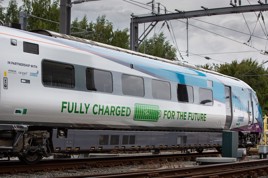A UK project to develop new powerful underfloor batteries could be the beginning of the end of the diesel multiple unit and save the need for expensive electrification.
The government is a 50:50 investor in a £1.4 million technology project that is claimed could be ideal for inter-city, regional and commuter routes.
The idea is to develop batteries that are small enough to fit under train floors - hitherto a major barrier to their widespread introduction.
Hitachi Rail UK is eyeing up world export markets in its collaboration with government-backed agency Innovate UK, the University of Birmingham, and the German-owned DB ESG consultancy.
Hitachi said in a statement on September 19 that it is “supporting British innovation and skills” to produce a new battery pack that is 40% smaller but over a fifth more powerful than what is currently available.
Battery trials have been conducted on a TransPennine Express Class 802 unit to assess performance and measure emissions reduction, with the aim of reducing operational costs by up to 30%. The battery fits inside the same engineering envelope previously occupied by the diesel engine and makes the carriage slightly lighter overall. “Ensuring weight neutrality was a key objective of the trial because we need to ensure no risk of increased track degradation or rising track access fees for operators,” said the company.
The consortium envisages a wide application on regional services, where a smaller battery is essential to enable it to go under train floors (currently a problem because of platform heights).
Other issues that need to be addressed are the ability to retrofit existing train sets, making them compatible with the rest of a train’s electrical system, ease of maintenance, eliminating fire risks, and cooling capacity.
The new battery is being produced by Turntide Technologies, and is of the LFP (Lithium Iron Phosphate) type. The contribution of the Birmingham Centre for Railway Research and Education (BCRRE) is to include the use of simulators to validate performance on representative UK routes.
Hitachi has already scored successes with the world’s first passenger battery train in Japan, and rolling out the Masaccio (Europe’s first battery hybrid train) in Italy in 2022. It wants to have an inter-city version, known as the EuroMasaccio, to open up more European markets.
In the UK, all eyes are on TPE 802207, which was built as an electro-diesel bi-mode set.
Two months of trials (not in passenger service) began between York and Manchester Airport and between Leeds and Liverpool Lime Street at the end of August, to assess its ability to improve performance on hills, fuel and emission savings, charging via regenerative braking, and going into zero-emission battery mode in stations.
Koji Agatsuma, Chief Technology Officer Vehicles, Hitachi Rail, said: “The acceleration of battery innovation is incredible. We use our expertise from Italy, Japan and the UK to ensure our partners remain at the forefront of battery technology.”
He added: “We are always working on the next generation of smaller and more powerful batteries to reduce cost on railways by negating electrification infrastructure spend or removing diesel engines entirely.”
Hitachi expanded its technology interests earlier this year with the acquisition of Thales’ Ground Transportation Systems business (GTS), which employs 24,000 people across 51 countries. This has enhanced its expertise in UK signalling, which underpins 60% of the Transport for London network.
Derby-based DB ESG, established in 1995, specialises in advising how rolling stock can be re-engineered.
Turntide Technologies, a worldwide company with offices in Gateshead, is bringing expertise in high-performance components that include electrification and batteries.














Login to comment
Comments
No comments have been made yet.